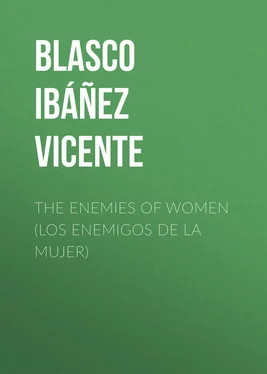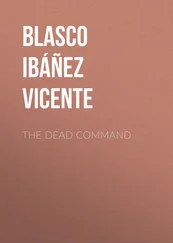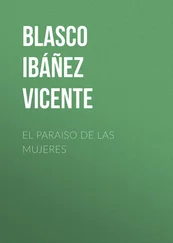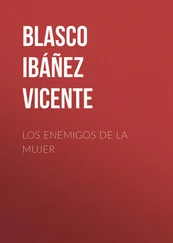Vicente Blasco Ibáñez - The Enemies of Women (Los enemigos de la mujer)
Здесь есть возможность читать онлайн «Vicente Blasco Ibáñez - The Enemies of Women (Los enemigos de la mujer)» — ознакомительный отрывок электронной книги совершенно бесплатно, а после прочтения отрывка купить полную версию. В некоторых случаях можно слушать аудио, скачать через торрент в формате fb2 и присутствует краткое содержание. ISBN: , Жанр: foreign_prose, foreign_antique, foreign_language, на английском языке. Описание произведения, (предисловие) а так же отзывы посетителей доступны на портале библиотеки ЛибКат.
- Название:The Enemies of Women (Los enemigos de la mujer)
- Автор:
- Жанр:
- Год:неизвестен
- ISBN:http://www.gutenberg.org/ebooks/38458
- Рейтинг книги:3 / 5. Голосов: 1
-
Избранное:Добавить в избранное
- Отзывы:
-
Ваша оценка:
- 60
- 1
- 2
- 3
- 4
- 5
The Enemies of Women (Los enemigos de la mujer): краткое содержание, описание и аннотация
Предлагаем к чтению аннотацию, описание, краткое содержание или предисловие (зависит от того, что написал сам автор книги «The Enemies of Women (Los enemigos de la mujer)»). Если вы не нашли необходимую информацию о книге — напишите в комментариях, мы постараемся отыскать её.
The Enemies of Women (Los enemigos de la mujer) — читать онлайн ознакомительный отрывок
Ниже представлен текст книги, разбитый по страницам. Система сохранения места последней прочитанной страницы, позволяет с удобством читать онлайн бесплатно книгу «The Enemies of Women (Los enemigos de la mujer)», без необходимости каждый раз заново искать на чём Вы остановились. Поставьте закладку, и сможете в любой момент перейти на страницу, на которой закончили чтение.
Интервал:
Закладка:
Toledo's dreams of splendid and showy toggery were now realized magnificently. With the Princess he did not need to fear the scruples sometimes shown by Saldaña, who hated extravagance and mismanagement. The great lady even felt disdain for those who were niggardly in availing themselves of her generosity. Don Marcos was enabled to change his attire several times a day, and held long conferences with famous tailors. He sought personal elegance. He wished to dress like a gentleman of distinction, but at the same time to wear clothes of a cut that would plainly show that he was accustomed to uniforms: He had in mind something like a Napoleonic Marshal obliged to wear a dress suit. Through his barber, likewise, he effected a great transformation. He imitated the manner in which the General had worn his hair, with a part that started at his forehead and ended at the back of his neck, and with stray locks hanging down at the temples. His mustache was taught to mingle with his side whiskers, in the Russian fashion. In accompanying the Princess, he learned to kiss ladies' hands with the grace and ease of an old courtier. He also learned to carry on long conversations without saying anything, to keep himself in the background, practically unseen, while his superiors were talking.
When the Princess, after the first year of mourning, resolutely returned to her box at the Opera, Don Marcos attended her, remaining discreetly in the rear, like the Chamberlain of a Queen. One evening, during an intermission, on passing to the front of her box, the Princess heard the Colonel telling an old French general, a friend of the house, about the battle of Villablanca.
"And the Marquis said to me: 'Now it's your chance, Toledo: Let's see how you can make out with a bayonet charge.' So I bared my sword, and at the head of my regiment…"
"He's a true soldier," interrupted the Princess, "a worthy companion of my hero… The Marquis often talked to me about him."
And at that moment she was really sure she had heard the silent Saldaña relate the gallant deeds of his aide-de-camp.
The Russian teacher, regarded by Toledo as an unpleasant person who would bear watching, soon left the Lubimoff palace. Perhaps he was jealous of the Colonel's growing influence; perhaps mysterious reasons needed his attention far from Paris. The Princess did not mind in the least the disappearance of the scholar. She had forgotten her rebellious looking Russians; she stopped giving them money. At present she had other interests.
She suddenly evinced a desire to live for some time in London, and for this reason, she granted her son's request to be allowed to travel alone throughout Europe.
"You're a man now; you will soon be fourteen. Travel, and don't stop at expense; always remember that you are Prince Lubimoff… The Colonel will go with you. He will be your aide, as he was for the heroic Marquis."
His first trip was to Spain. Michael Fedor wanted to see his father's native land. Toledo thought it in point for the young Prince to show great admiration for Spain. Michael must remember they were in the enemy's country. Toledo was a Carlist Colonel who had refused amnesty, and had declined to recognize the reigning dynasty! But they traveled for three months in Spain, without being noticed except for the largeness of their tips. It is quite true that Toledo avoided coming in contact with any of his former comrades. He felt that he now belonged to a different world. Inwardly he felt the same change the General had.
As soon as Michael Fedor had recovered from his first enthusiasm for bull fighting, they continued their travels across the continent as far as Russia, arriving considerably later than the numerous letters of introduction sent by the Princess Lubimoff to her relatives. The Prince remained there a year, visiting his less distant estates, and making the acquaintance of all the great families in his mother's circle of friends. The Colonel talked grandiloquently about everything related to war with various generals who received him as an equal. Was he not the aide and companion in heroic deeds of Saldaña, whom they had known in the war against Turkey, when they were mere subalterns?
The former friends of the Princess Lubimoff told her son some unexpected news. His mother had announced her forthcoming marriage to an English gentleman. She had written to the Czar asking his authorization. This news startled no one save Michael Fedor. The times of the wild Nadina had long since passed. Her actions aroused no further interest. Other young Princesses had effaced her memory with adventures that caused even greater commotion. No one save a few of the ladies of the old court, when they forgot their cares and interests as mothers, would bring to mind the Princess Lubimoff, recalling days of vanished youth, which for old people are always more interesting than the present.
When the young man returned to the Paris palace, he found his mother as much of a Princess as ever, but married to a Scotch gentleman, Sir Edwin Macdonald.
"Some day you will leave me," she said with a tragic note in her voice she used on great occasions. "A Prince Lubimoff should live at the court, serve his Emperor, be an officer in the Guard; and I need a companion, some one to lean on. Sir Edwin is the personification of distinction; but don't ever think that I shall forget your father. Never!.. My hero!"
Michael Fedor saw a gentleman who, indeed, was "the personification of distinction"; attentive to everyone, very precise in his bearing, a man of few words, who shut himself up for long hours – studying, according to the Princess. English politics was his preoccupation, and his one great dream was to return to Parliament, which he had been forced to leave by defeat at election.
This cold man, with a pale smile and extreme insistence on good form even in the most trivial actions, neither displeased Michael as a step-father nor appealed to him as a friend. He was an inoffensive, somewhat stuffy person, whom Michael grew accustomed to seeing every day in his father's former place, and whom he had expected to see sooner or later anyhow.
This marriage brought other people to the Lubimoff palace, with all the intimacy inspired by relationship.
One of Sir Edwin's brothers had been obliged, like all the second sons in wealthy British families, to go out in the world and earn his living. After a life of adventure, he had finally settled down in the United States, near the Mexican border, and had soon found himself, through a marriage with an heiress of the country, much richer than his elder brother.
His wife was a Mexican. She owned famous silver mines in the interior and vast ranches on the border. She had only one daughter; and the latter was in her eighth year when Arthur Macdonald died as a result of a fall from his horse. The widow, with her little Alicia, moved to Europe. She wanted to live in London, to be near her brother-in-law, Sir Edwin, then a member of Parliament, and much admired by the Mexican woman as one of the directors of the world's affairs. Later she established herself in Paris, as the capital most to her taste, and as the place where she could meet many people from Mexico.
The Princess Lubimoff treated her relative well, although her friendship suffered sudden changes, often going from extreme affection to sudden coldness.
She and Doña Mercedes could talk about mines and vast estates, although neither of them had any accurate knowledge of their respective fortunes. They estimated their wealth only by the enormous quantities of money – millions of francs a year – which their distant business agents sent them, and which they spent without knowing just how. There was another thing which attracted the Princess, in her moments of good will, to Doña Mercedes: she herself was blond, while the Spanish Creole still kept traces of Hispanic-Aztec beauty, with a dark, somewhat olive complexion, large, wide-open, almond eyes, and hair astonishing for its blackness, brilliancy, and length.
Читать дальшеИнтервал:
Закладка:
Похожие книги на «The Enemies of Women (Los enemigos de la mujer)»
Представляем Вашему вниманию похожие книги на «The Enemies of Women (Los enemigos de la mujer)» списком для выбора. Мы отобрали схожую по названию и смыслу литературу в надежде предоставить читателям больше вариантов отыскать новые, интересные, ещё непрочитанные произведения.
Обсуждение, отзывы о книге «The Enemies of Women (Los enemigos de la mujer)» и просто собственные мнения читателей. Оставьте ваши комментарии, напишите, что Вы думаете о произведении, его смысле или главных героях. Укажите что конкретно понравилось, а что нет, и почему Вы так считаете.












